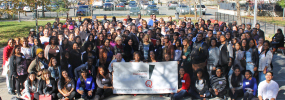
Support Queens Community House
Queens Community House provides individuals and families with the tools to enrich their lives and build healthy, inclusive communities.
Why Some Manhattan Seniors Have Had A Better Shot at Getting the Vaccine Than Their Peers | February 2021: The S.T.A.R. Senior Center on 187th Street in Washington Heights is physically closed. But for the past three weeks, its leadership, caseworkers and even kitchen staff have been working long days from their homes with one goal only: getting seniors signed up for the COVID-19 vaccine.
Maggie Hernandez, a caseworker at S.T.A.R., said that as of Tuesday they had gotten 127 members vaccinated, out of 476 active members, nearly all of whom speak Spanish exclusively and live in the largely Hispanic Washington Heights area or across the river in the Bronx.
About eight minutes into a phone conversation with a reporter Friday, Hernandez said it was a “miracle” that she hadn’t been interrupted by a call from a senior inquiring about the vaccine.
“People want the vaccine so badly, and they're calling every second of the day,” she said. “From eight to four, we’re just going, going, going.”
At other senior centers around the city, it is also all hands on deck to call adults aged 65 and older to educate them about the vaccine — it’s safe for the elderly, it contains no active virus, and you can’t get COVID-19 from receiving it — and try to schedule appointments for them. For many elderly New Yorkers without smartphones or email access or who don’t speak English, navigating the scheduling websites and hotlines alone is impossible.
That’s where the process breaks down for most centers. They are using the same glitchy, complicated sign-up portals as the rest of the city’s vaccine-eligible citizens to try and get appointments at overwhelmed and under-supplied vaccine sites throughout the city.
Yet since people 65 and over became eligible for the vaccine about three weeks ago, S.T.A.R. and a group of about 40 other senior care centers, churches, and community organizations in Upper Manhattan have had a secret weapon of sorts: a parallel sign-up page for the vaccine site at the Washington Heights Armory that allows them to create appointments on their members’ behalf without needing an email address or cell phone number.
The special website, created by NewYork-Presbyterian Hospital, the hospital network running the Armory operation, has given elderly residents in the area who belong to one of the organizations in the group a leg up over their peers elsewhere in the city, and it’s been highly successful, according to senior care providers.
Of the roughly 25,000 appointments the Armory has seen so far, about 10,000 appointments have been for northern Manhattan residents, according to a spokesperson for the hospital.
That includes about 6,000 appointments for elderly people made through the special portal, the spokesperson said.
The Armory was the focus of controversy last week when NY1’s partner THE CITY reported that the site was vaccinating a large number of suburbanites, and didn’t have people who spoke Spanish working at its entrance.
The main scheduling portal for the Armory site is “not only strange and unwieldy, but sometimes it kicks you out, sometimes it says no vaccines available,” said Fern Hertzberg, the executive director at ARC XVI Fort Washington, a senior services provider whose clients are nearly all exclusively Spanish-speaking, who encouraged the hospital to make the special portal.
“It’s a challenge,” Hertzberg said, “and we’re trying to supersede the challenge by creating a workaround.”
NewYork-Presbyterian said that while it has trained dozens of local organizations on the special portal, it did not advertise it publicly.
“We have been in direct contact with local organizations and are working with elected officials and key community partners who serve the 65+ population to engage them in this effort and ensure access to all,” said Alexandra Simpson, a spokesperson for the hospital, in an email.
The system has allowed centers like ARC XVI and S.T.A.R. to efficiently make appointments, without trying to set up special online profiles on their seniors’ behalf or wait hours on the phone.
“We’re registering them if they're not registered, we put them in the system, and then we move on to the next person,” said Hernandez. “It’s like this revolving door.”
‘There are no vaccines, there are no appointments’
Senior care centers and community organizations that serve seniors elsewhere in the city are not so lucky.
Some organizations, like the Queens Community House, are slowly reaching out to thousands of members to educate them about the vaccine, using scripts and information provided by the Department for the Aging (DFTA), the city agency that oversees senior care, and the city’s Department of Health and Mental Hygiene.
Staff and volunteers at Queens Community House had reached 1,500 out of 5,000 of their members as of last week but had only secured vaccines for a few dozen, according to Irina Sarkisova, the director of senior centers at the organization.
Click here for the full article.